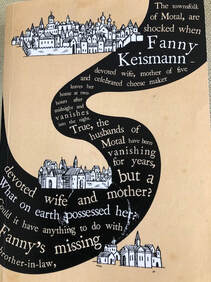 One of the most original and unusual books I’ve read in a long time is The Slaughterman’s Daughter by Yaniv Iczkovits, a recent release, translated from the Hebrew, from the always impressive MacLehose Press – a UK publisher that specialises in works in translation. Set in the Pale of Settlement of Imperial Russia at the end of the 1800s, it tells the story of Fanny Keismann, the eponymous daughter of a kosher butcher, who goes in search of her brother-in-law, Zvi-Meir, after he abandons her sister and their two children. Fanny’s journey to Minsk – now the capital of Belarus and recently in the news for mass protests against its tinpot dictator Alexander Lukashenko who refuses to give up power – is fraught with danger. Fanny’s talent with a butcher’s knife stands her in good stead to quell her foes, but it also sets in train a fantastical series of events that spiral out of control and, unsurprisingly, get her into trouble with the law. Like the stories of Sholem Aleichem, this book and its cast of motley characters evokes a nostalgia for the shtetls of Belarus, Ukraine and elsewhere in the region before the Russian Revolution, and a way of life that was already beginning to unravel when this novel was set. Hundreds of thousands of Jews had begun to emigrate to the west (mostly the United States) in search of an escape from discrimination, anti-Semitic violence and economic hardship from the 1880s onwards. Later, of course, during the Nazi occupation of 1941-44, the shtetls were destroyed altogether, their inhabitants murdered or, in the case of a lucky few, forced to flee eastwards in a bid for survival. It is impossible not to feel a deep regret for the disappearance of these vibrant communities where our ancestors lived for generations, settlements that were extinguished so brutally. I for one am fascinated by stories and images of the lost Jewish world of Eastern Europe. But the shtetls were home to a way of life that was tough and unenviable, as this novel demonstrates. They were generally poor, miserable places, where, “The Jews have huddled so close to each other that they have not left themselves any space to breathe”. And where Jew and Goy often distrust one another absolutely. For most of us with origins in the kinds of places that Iczkovits writes about, when we think of this period of history what we remember are the pogroms – the brutal anti-Semitic violence that broke out periodically in Russia in the late 19th and early 20th centuries. This book, filled with black humour and deep affection, but also gritty realism, provides a wonderful illustration that there was much more to this time and place. The author describes a way of life where, outdoors, “The market is a-bustle with the clamour of man and beast, wooden houses quaking on either side of the parched street. The cattle are on edge and the geese stretch their necks, ready to snap at anyone who might come near them. An east wind regurgitates a stench of foul breath. The townsfolk add weight to their words with gestures and gesticulations. Deals are struck: one earns, another pays, while envy and resentment thrive on the seething tension. Such is the way of the world.” Meanwhile, indoors, mothers share a bed with their multiple children and face continual curses and criticism from their in-laws in the next room, who treat them like servants. Yaniv Iczkovits is an Israeli born of Holocaust survivors. “What I wanted to do was to bring these forgotten memories of this lost world into 21st century Israel, and to present the richness of a culture that is now gone, but is still a major part of who we were and what we are,” he says.
1 Comment
|
Keeping stories aliveThis blog aims to discuss historical events relating to the Jewish communities of Ukraine, and of Eastern Europe more widely. As a storyteller, I hope to keep alive stories of the past and remember those who told or experienced them. Like so many others, I am deeply troubled by the war in Ukraine and for the foreseeable future, most articles published here will focus on the war, with an emphasis on parallels with other tumultuous periods in Ukraine's tragic history. Archives
March 2024
Categories
All
|
 RSS Feed
RSS Feed
